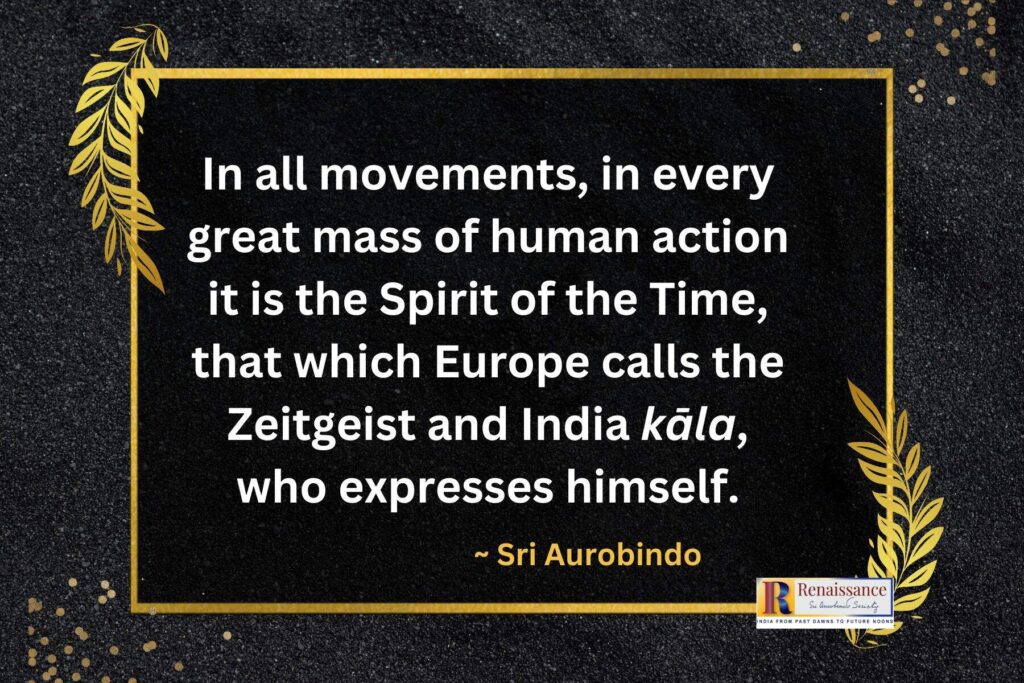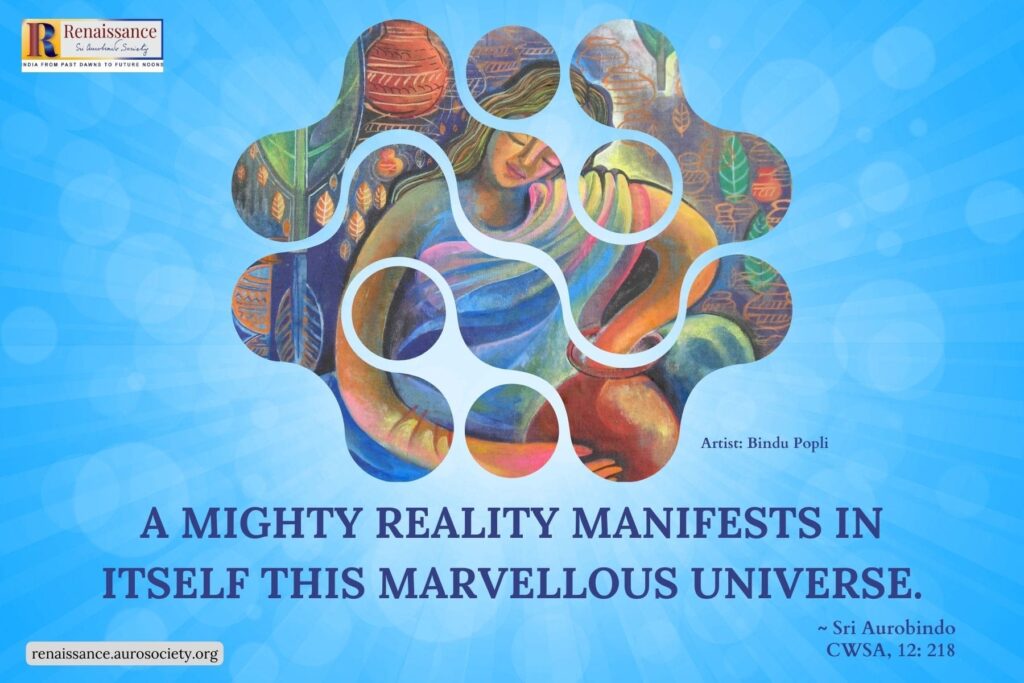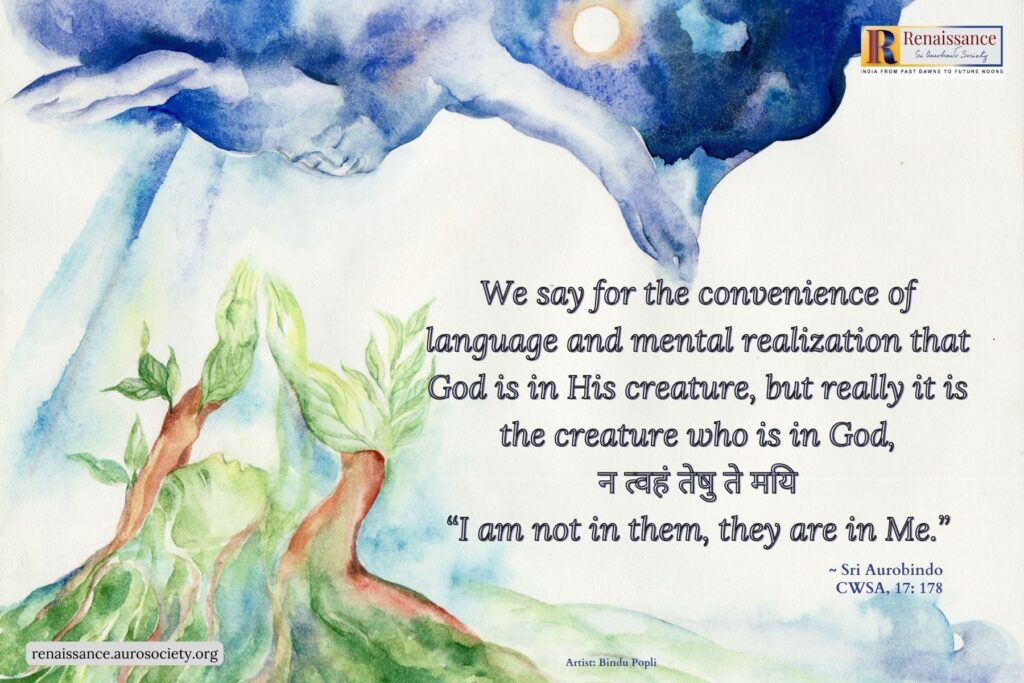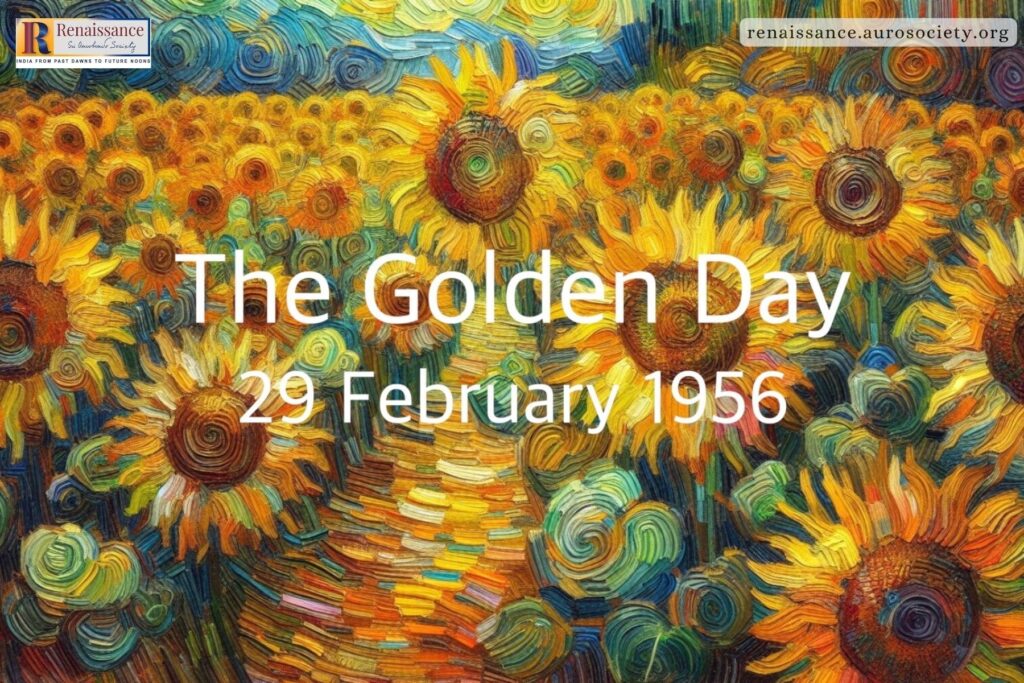Editor’s note: Four long passages from Sri Aurobindo are selected for this feature. These passages deal with the Supreme Timeless Spirit manifesting as time in the world; the immeasurable getting measured for the purpose of creation.
In all movements, in every great mass of human action it is the Spirit of the Time, that which Europe calls the Zeitgeist and India kāla, who expresses himself. The very names are deeply significant. Kali, the mother of all and destroyer of all, is the śakti that works in secret in the heart of humanity, manifesting herself in the perpetual surge of men, institutions and movements; Mahakala is the Spirit within whose energy goes abroad in her and moulds the progress of the world and the destiny of the nations. His is the impetus which fulfills itself in [Time, and once there is movement, impetus from the Spirit within, Time and the Mother take charge of it, prepare, ripen and fulfil.
When the Zeitgeist, God in Time, moves in a settled direction, then all the forces of the world are called in to swell the established current towards the purpose decreed. That which consciously helps, swells it, but that which hinders swells it still more, and like a wave on the wind-swept ocean, now rising, now falling, now high on the crest of victory and increase, now down in the trough of discouragement and defeat, the impulse from the hidden Source sweeps onwards to preordained fulfilment. Man may help or man may resist, but the Zeitgeist works, shapes, overbears, insists.
The great and memorable vision of Kurukshetra when Sri Krishna manifesting His world-form declared Himself as destroying Time, is significant of this deep perception of humanity. When Arjuna wished to cast aside his bow and quiver, when he said, “This is a sin we do and a great destruction of men and brothers, I will forbear,” Sri Krishna, after convincing his intellect of error, proceeded by that marvellous vision described in the eleventh canto of the Gita to stamp the truth of things upon his imagination. Thus run the mighty stanzas:
कालोऽस्मि लोकक्षयकृत् प्रवृद्धो
लोकान् समाहर्तुमिह प्रवृत्तः।
ऋतेऽपि त्वां न भविष्यन्ति सर्वे
येऽवस्थिताः प्रत्यनीकेषु योधाः।।
तस्मात्त्वमुत्तिष्ठ यशो लभस्व
जित्वा शत्रून भुङ्क्ष्व राज्यं समृद्धम्।
मयैवैते निहताः पुर्वमेव
निमित्तमात्रं भव सव्यसाचिन्।।1
“I am Time who waste and destroy the peoples; lo, I have arisen in my might, I am here to swallow up the nations. Even without thee all they shall not be, the men of war who stand arrayed in the opposing squadrons. Therefore do thou arise and get thee great glory, conquer thy foes and enjoy a great and wealthy empire. For these, they were slain even before and it is I who have slain them; be the occasion only, O Savyasachin.”
It is not as the slow process of Time that Sri Krishna manifests Himself; it is as the Zeitgeist consummating in a moment the work carefully prepared for decades that He appears to Arjuna. All have been moving inevitably towards the catastrophe of Kurukshetra. Men did not know it; those who would have done everything possible to avert the calamity, helped its coming by their action or inaction; those who had a glimpse of it strove in vain to stop the wheels of Fate; Sri Krishna Himself as the niṣkāma karmayogin who does His duty without regard to results, went on that hopeless embassy to Hastinapura; but the Zeitgeist overbore all.
It was only afterwards that men saw how like rivers speeding towards the sea, like moths winging towards the lighted flame, all that splendid, powerful and arrogant Indian world with its clans of kings and its weapons and its chariots and its gigantic armies were rushing towards the open mouths of the Destroyer to be lost in His mighty jaws, to be mangled between His gnashing teeth. In the līlā of the Eternal, there are movements that are terrible as well as movements that are sweet and beautiful.
The dance of Brindaban is not complete without the death-dance of Kurukshetra; for each is a part of that great harmonic movement of the world which progresses from discord to accord, from hatred and strife to love and brotherhood, from evil to the fulfilment of the evolution by the transformation of suffering and sin into beauty, bliss and good, śivam, śāntam, śuddham, ānandam.
Who could resist the purpose of the Zeitgeist?
There were strong men in India then by the hundred, great philosophers and Yogins, subtle statesmen, leaders of men, kings of thought and action, the efflorescence of a mighty intellectual civilisation at its height. A little turning to the right instead of to the left on the part of a few of these would, it might seem, have averted the whole catastrophe.
So Arjuna thought when he flung aside his bow. He was the whole hope of the Pandavas and without him their victory must seem a mere dream and to fight an act of madness. Yet it is to him that the Zeitgeist proclaims the utter helplessness of the mightiest and the sure fulfilment of God’s decree. “Even without thee all they shall not be, the men of war who stand arrayed in the opposing squadrons.”
For these men are only alive in the body; in that which stands behind and fulfils itself, they are dead men. Whom God protects who shall slay? Whom God has slain who shall protect? The man who slays is only the occasion, the instrument by which the thing done behind the veil becomes the thing done on this side of it. That which was true of the great slaying at Kurukshetra is true of all things that are done in this world, of all the creation, destruction and preservation that make up the līlā.
The greatness of this teaching is for the great.
Those who are commissioned to bring about mighty changes are full of the force of the Zeitgeist. Kali has entered into them and Kali, when she enters into a man, cares nothing for rationality and possibility. She is the force of Nature that whirls the stars in their orbits lightly as a child might swing a ball, and to that force there is nothing impossible. She is aghaṭanaghaṭanapaṭīyasī, very skilful in bringing about the impossible. She is the devātmaśaktiḥ svaguṇair nigūḍhā, the Power of the Divine Spirit hidden in the modes of its own workings, and she needs nothing but time to carry out the purpose with which she is commissioned.
She moves in Time and the very movement fulfils itself, creates its means, accomplishes its ends. It is not an accident that she works in one man more than in another. He is chosen because he is a likely vessel, and having chosen him she neither rejects him till the purpose is fulfilled nor allows him to reject her. Therefore Sri Krishna tells Arjuna:
यदहङ्कारमाश्रित्य न योत्स्य इयि मन्यसे।
मिथ्यैष व्यवसायस्ते प्रकृतिस्त्वां नियोक्ष्यति।।
“The thought which thou thinkest and takest refuge in egoism saying, ‘I will not fight’, this thy resolve is a vain thing; Nature will yoke thee to thy work.”
When a man seems to have rejected his work, it merely means that his work is over and Kali leaves him for another. When a man who has carried out a great work is destroyed, it is for the egoism by which he has misused the force within that the force itself breaks him to pieces, as it broke Napoleon.
Some instruments are treasured up, some are flung aside and shattered, but all are instruments.
This is the greatness of great men, not that by their own strength they can determine great events, but that they are serviceable and specially-forged instruments of the Power which determines them. Mirabeau helped to create the French Revolution, no man more. When he set himself against it and strove, becoming a prop of monarchy, to hold back the wheel, did the French Revolution stop for the backsliding of France’s mightiest? Kali put her foot on Mirabeau and he disappeared; but the Revolution went on, for the Revolution was the manifestation of the Zeitgeist, the Revolution was the will of God.
So it is always. The men who prided themselves that great events were their work, because they seemed to have an initial hand in them, go down into the trench of Time and others march forward over their shattered reputations. Those who are swept forward by Kali within them and make no terms with Fate, they alone survive. The greatness of individuals is the greatness of the eternal Energy within.
(Sri Aurobindo, CWSA, Vol. 13, pp.29-32)
***
The Supreme is the Purushottama, eternal beyond all manifestation, infinite beyond all limitation by Time or Space or Causality or any of his numberless qualities and features. But this does not mean that in his supreme eternity he is unconnected with all that happens here, cut off from world and Nature, aloof from all these beings.
He is the supreme ineffable Brahman, he is impersonal self, he is all personal existences. Spirit here and life and matter, soul and Nature and the works of Nature are aspects and movements of his infinite and eternal existence. He is the supreme transcendent Spirit and all comes into manifestation from him and are his forms and his self-powers.
As the one self he is here all-pervasive and equal and impersonal in man and animal and thing and object and every force of Nature. He is the supreme Soul and all souls are tireless flames of this one Soul.
All living beings are in their spiritual personality deathless portions of the one Person or Purusha. He is the eternal Master of all manifested existence, Lord of the worlds and their creatures. He is the omnipotent originator of all actions, not bound by his works, and to him go all action and effort and sacrifice. He is in all and all are in him; he has become all and yet too he is above all and not limited by his creations.
He is the transcendent Divine; he descends as the Avatar; he is manifest by his power in the Vibhuti; he is the Godhead secret in every human being. All the gods whom men worship are only personalities and forms and names and mental bodies of the one Divine Existence.
The Supreme has manifested the world from his spiritual essence and in his own infinite existence and manifested himself too variously in the world. All things are his powers and figures B.G.10.19 and to the powers and figures of him there is no end, because he himself is infinite. As a pervading and containing impersonal self-existence he informs and sustains equally and without any partiality, preference or attachment to any person or thing or happening or feature all this infinite manifestation in Time and the universe.
This pure and equal Self does not act, but supports impartially all the action of things.
And yet it is the Supreme, but as the cosmic Spirit and the Time Spirit, who wills and conducts and determines the action of the world through his multitudinous power-to-be, that power of the Spirit which we call Nature. He creates, sustains and destroys his creations.
He is seated too in the heart of every living creature and from there as a secret Power in the individual, no less than from his universal presence in the Cosmos, he originates by force of Nature, manifests some line of his mystery in quality of nature and in executive energy of nature, shapes each thing and being separately according to its kind and initiates and upholds all action. It is this transcendent first origination from the Supreme and this constant universal and individual manifestation of Him in things and beings which makes the complex character of the cosmos.
(Sri Aurobindo, CWSA, Vol. 19, pp. 577-579)
***
Time and Space are not limited, they are infinite—they are the terms of an extension of consciousness in which things take place or are arranged in a certain relation, succession, order. There are again different orders of Time and Space; that too depends on the consciousness. The Eternal is extended in Time and Space, but he is also beyond all Time and Space.
Timelessness and Time are two terms of the eternal existence.
The Spaceless Eternal is not one indivisible infinity of Space, there is in it no near or far, no here or there—the Timeless Eternal is not measurable by years or hours or aeons, the experience of it has been described as the eternal moment. But for the mind this state cannot be described except by negatives,—one has to go beyond and to realise it.
Time is to the Intuition an extension of consciousness in which happenings are arranged and has not the same rigidity that it has to the intellect.
The idea of time may be a mental construction, but the sense of it may not be. Savages have the idea of time but it is in connection with the sun and stars and the lapse of day and night and the seasons, not perhaps a separate construction—but one is not sure for they have metaphysical conceptions of their own.
Animals are not, I think, so limited in their consciousness—they have not only sensations, but an acute memory of certain things, observation, clear associations, an intelligence that plans, a very accurate sense of place and memory of place, an initial power of reasoning (not reflectively as the human mind does, but practically as any vital mind can do).
I have seen a young kitten observing, arriving at a correct conclusion, proceeding to do what was necessary for her purpose, a necessity imposed by that conclusion, just as a human child might do. We cannot therefore say that animals have no ideas. No clear measure of yesterday and tomorrow, perhaps, but the perception of past and future needs is there and of right times and seasons also—all vital, practical, not reflectively mental in the human way.
But it is true that when one gets beyond the mind, this sense of time changes into timelessness, into the eternal present.
(Sri Aurobindo, CWSA, Vol 28, pp.403-404)

***
It is the Timeless manifest as Time and World-Spirit from whom the command to action proceeds. For certainly the Godhead B.G.11.32 when he says, “I am Time the Destroyer of beings,” does not mean either that he is the Time-Spirit alone or that the whole essence of the Time-Spirit is destruction. But it is this which is the present will of his workings, pravṛtti.
Destruction is always a simultaneous or alternate element which keeps pace with creation and it is by destroying and renewing that the Master of Life does his long work of preservation. More, destruction is the first condition of progress. Inwardly, the man who does not destroy his lower self-formations, cannot rise to a greater existence.
Outwardly also, the nation or community or race which shrinks too long from destroying and replacing its past forms of life, is itself destroyed, rots and perishes and out of its debris other nations, communities and races are formed. By destruction of the old giant occupants man made himself a place upon earth. By destruction of the Titans the gods maintain the continuity of the divine Law in the cosmos.
Whoever prematurely attempts to get rid of this law of battle and destruction, strives vainly against the greater will of the World-Spirit. Whoever turns from it in the weakness of his lower members, as did Arjuna in the beginning,—therefore was his shrinking condemned as a small and false pity, an inglorious, an un-Aryan and unheavenly feebleness of heart and impotence of spirit, klaibyaṁ, kṣudraṁ ḥrdaya-daurbalyam, B.G.2.3 —is showing not true virtue, but a want of spiritual courage to face the sterner truths of Nature and of action and existence. Man can only exceed the law of battle by discovering the greater law of his immortality.
There are those who seek this where it always exists and must primarily be found, in the higher reaches of the pure spirit, and to find it turn away from a world governed by the law of Death. That is an individual solution which makes no difference to mankind and the world, or rather makes only this difference that they are deprived of so much spiritual power which might have helped them forward in the painful march of their evolution.
(Sri Aurobindo, CWSA, Vol 19, pp. 484-485)



